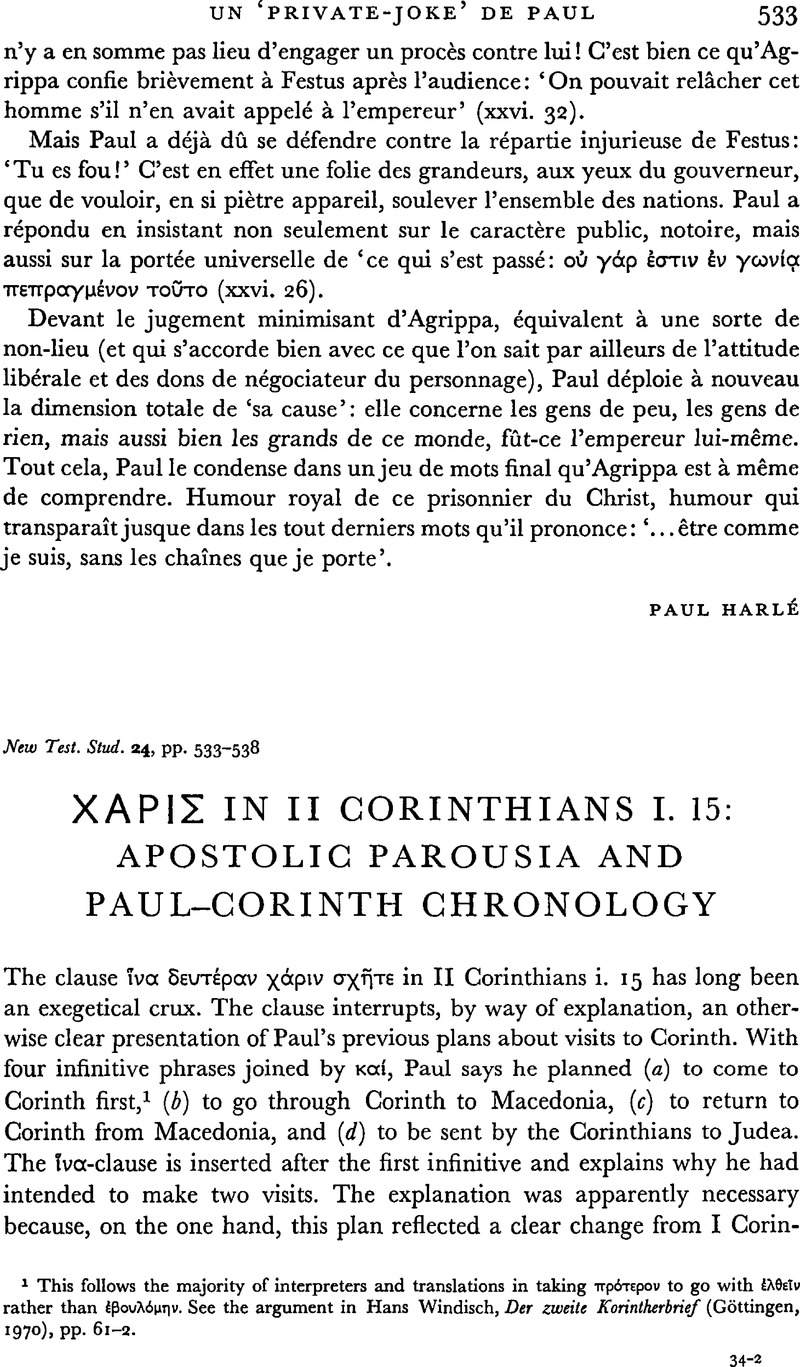No CrossRef data available.
Article contents
ΧАΡΊΣ in II Corinthians i. 15: Apostolic Parousia and Paul-Corinth Chronology
Published online by Cambridge University Press: 05 February 2009
Abstract

- Type
- Short Studies
- Information
- Copyright
- Copyright © Cambridge University Press 1978
References
page 533 note 1 This follows the majority of interpreters and translations in taking πρότερον to go with έλθεīν rather than έβουλόμην. See the argument in Windisch, Hans, Der zweite Korintherbrief (Göttingen, 1970), pp. 61–2.Google Scholar
page 534 note 1 AV, RV, NEB, JerusBib, NIV; J. Calvin, J. J. Lias, J. Denney, P. E. Hughes.
page 534 note 2 Barrett, C. K., Commentary (London, 1973), p. 69.Google Scholar
page 534 note 3 NASB, Berkeley, TEV.
page 534 note 4 Ronald Knox.
page 534 note 5 E. B. Allo (Barrett's translation).
page 534 note 6 Bauer-Arndt-Gingrich.
page 534 note 7 While it is granted that δıά with δıέρχομαı would ordinarily mean nothing more than ‘through’, the argument of this paper is that Rom. xv. 22–9 is the clue to much of what is said here, both conceptually and linguistically. In the Romans passage, where it is abundantly clear that his basic reason for coming to Rome was to be sent on his way by them, he concludes by saying: άπελεὐσομαı δı′ὑμν είς Σπανίαν.
page 535 note 1 The only other place in Paul where χάıς could bear the meaning it is traditionally given here is as a variant for καὐχημα in I Cor. ix. 16 (א* D E F G pc). But χάρıς is so suspect here that even Tischendorf refused to follow the combined evidence of א and D.
page 535 note 2 For an analysis of this feature in the Pauline letters see Funk, Robert W., ‘The Apostolic Parousia: Form and Significance’, Christian History and Interpretation: Studies Presented to John Knox (eds. Farmer, W. R., Moule, C. F. D., Niebuhr, R. R.; Cambridge, 1967), pp. 249–68.Google Scholar
page 535 note 3 ‘Some difficult passages in the first chapter of II Corinthians’, J. B. L. 6 (1886), 38, 36.Google Scholar
It is difficult to know whether translators are translating χάρıν as ‘joy’ or simply reading the variant itself. See the RSV, Twentieth Century NT, Weymouth, Moffatt, Goodspeed, Rotherham. Some of the at least use the Westcott-Hort text which reads χαράν. χαράν is also favoured by A. Plummer and J. Hering.
page 535 note 4 Hom. 3 in 2 Cor.
page 535 note 5 Die Briefe an die Korinther (Das Neue Testament Deutsch 7; Göttingen, 1968), pp. 170–1.Google Scholar Cf. Beet, J. A., A Commentary on St Paul's Epistles to the Corinthians (London, 1885), p. 326.Google Scholar
page 536 note 1 Barrett, (op. cit. p, 216Google Scholar) and Metzger, B. M., ed., A Textual Commentary on the Greek New Testament (London and New York, 1971), p. 581Google Scholar, both consider ήμν έν ὑμίν to be the more difficult reading. I demur. Most of the other things wherein the Corinthians are here said to abound are benefits received (faith, speech, knowledge). Love from Paul to them fits nicely in that context. What is ‘difficult’, and a sensitive scribe would have sensed it, is any suggestion in II Corinthians that their love abounded toward Paul. Surely this is the lectio difficilior.
page 536 note 2 Op. cit. p. 222.
page 537 note 1 Op. cit.
page 537 note 2 This reconstruction supports that suggested by Barrett, , op. cit. pp. 5–10.Google Scholar




